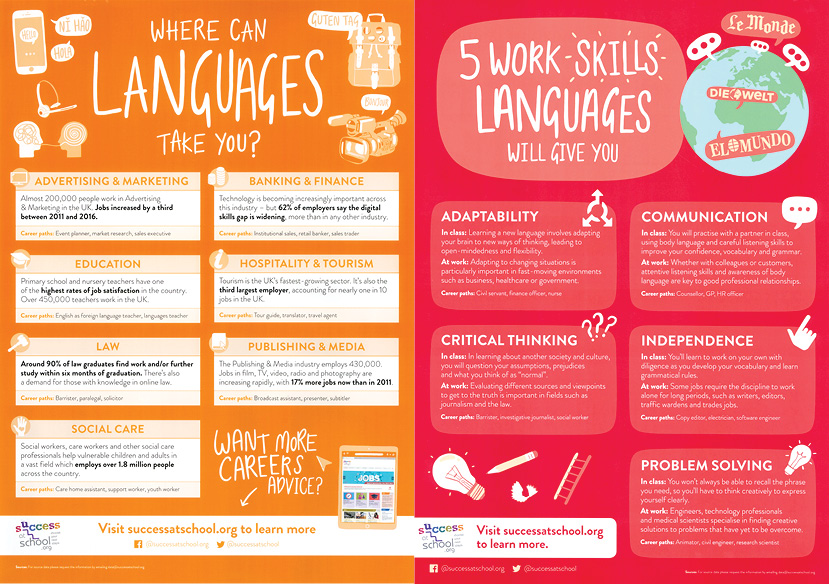French

Head of Department: Stuart Hood
Assistant Head of Department: Ms S. Kenward
Key Stage 3 (Year 7-9)
Year 7:
Unit 1 – Getting to know French – Phonics and sentence structure / Dictionary skills with infinitives – Present tense -ER verbs (full verb paradigm) and opinion phrases (aimer, détester, préférer)
Unit 2 – Regular verbs in the present tense (Mes passetemps) – Use of full verb paradigm and opinion phrases (aimer, détester, préférer)+ introducing a range of verbs
Unit 3 – Regular verbs, nouns and gender with adjectives
(Mon collège, Ma Ville) – Describing what we do at school and in town using a range of regular verbs.
Unit 4 – Irregular verbs – Avoir, être (Ma famille, mes amis et moi) – Describing friends and family – être plus adj. Describing appearances – avoir + cheveux/yeux. Avoir plus age. Expressions with avoir and differences with Eng – avoir faim/peur/honte/chaud/froid
Unit 5 – Reflexive verbs, modal verbs (Ma vie de tous les jours)
Talking about daily life using key reflexive and modal verbs. Continued development of vocabulary through use of a wide range of infinitives.
Unit 6 – Using irregular verbs faire & aller; The Near Future Tense
(Mon voyage en France) – Scheme of Learning building towards a day trip to France for the year 7 cohort studying French.
Year 8:
Unit 1 – Recap of key concepts covered in year 7 course including the role of the infinitive, the process of conjugation and the subject pronouns in French.
- Present tense -er verbs
- -ir and -re verbs
- irregular verbs, avoir, être, aller and faire
- negatives
- articles
- perfect tense through SAP
Unit 2 – Perfect tense with avoir irregular, boire, faire prendre voir
perfect tense with être + imperfect examples, c’était and j’étais
question words.
Unit 3 – adjectives, agreement, reflexive verbs, possessive adjectives + irregular verbs in present and past tense, venir, aller faire, être, future tense (using 3 tenses)
Unit 4 – adjectives, comparatives, possessive pronouns, prepositions, irregular verbs, boire, prendre, il faut + infinitive
partitive article + using 3 tenses
Unit 5 – modal verbs, vouloir, devoir, pouvoir, possessive adjectives, comparative and superlative, imperative form
Unit 6 – Combining all grammar structures in a project – build towards script writing and performance, film project + presentation
Year 9:
Unit 1 – Using present tense verbs, direct object pronouns, the near future tense, the perfect tense + three tenses together.
Unit 2 – Using “à” + definite article, il faut, the near and simple future, negatives
Revision of etre, avoir, faire and aller
Using three tenses
Unit 3 – Using masculine and feminine nouns, modal verbs, the imperfect tense, practising the future and imperfect tenses
Using three tenses
Unit 4 – Asking questions using inversion, the conditional, reflexive verbs, tense combination + using emphatic pronouns
Unit 5 – Using irregular verbs in the present tense, reflexive verbs in the present tense, the near future , the perfect tense, the imperfect tense (Using at least three tenses)
Unit 6 – Using depuis + the present tense, the comparative, the imperfect tense, using direct object pronouns + using superlative adjectives
Key Stage 4 (Year 10-11)
Year 10:
Le temps des loisirs, Jours ordinaires, jours de fête, De la ville à la campagne, Le grand large
Year 11:
Au collège, Au travail, Un œil sur le monde
Key Stage 5 (Year 12-13)
Year 12:
La famille en voie de changement, La « cyber-société », Le rôle du bénévolat, Une culture fière de son patrimoine, La musique francophone contemporaine, Le septième art, La Haine
Year 13:
Les aspects positifs d’une société diverse, Quelle vie pour les marginalisés, Comment on traite les criminels, Les ados, le droit de vote et l’engagement politique, Manifestations, grèves – à qui le pouvoir?, La politique et l’immigration, Boule de suif et autres contes de la guerre
Independent Learning Resources
- Students have log-ins for vocabexpress.com which they can use to increase their vocabulary.
- Students also have log-ins for pearsonactivelearn.com – which gives them access to exam focused vocabulary and skills training.
- ‘Studio’ textbooks are available in the library and can be used to support homework.
Key Stage 4
AQA
- Students have a blue booklet of speaking questions which they should revise for their speaking exam.
- The French CGP exam practice workbook is available in the library and can be used for listening, reading, translation, grammar and writing practice.
- Studio textbooks are available in the library and can be used to support homework.
- Students also have log-ins for pearsonactivelearn.com – which gives them access to exam focused vocabulary and skills training.
- Students have log-ins for vocabexpress.com which they can use to increase their vocabulary.
- Students should also practice describing photos using their photo description sheet
- Students can use lyricstraining.com for a fun way to do extra listening – try ‘choice mode’, it is especially accessible
Careers Advice

